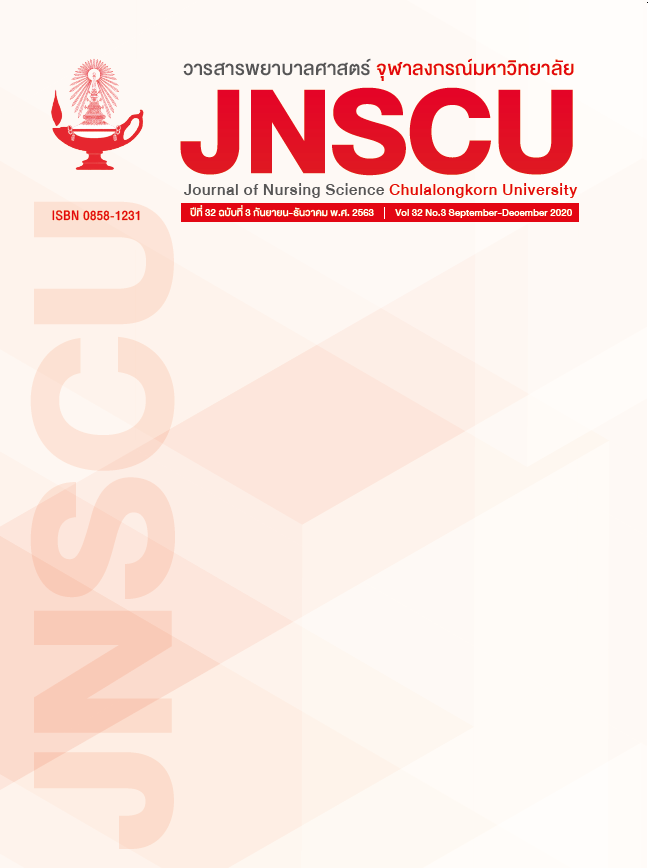ผลของโปรแกรมการส่งเสริมการดูแลตนเองต่อการรับรู้ความสามารถในการดูแลตนเอง เพื่อป้องกันการเกิดโรคหลอดเลือดสมองในผู้ป่วยความดันโลหิตสูง
คำสำคัญ:
โปรแกรมการส่งเสริมการดูแลตนเอง/การรับรู้ความสามารถในการดูแลตนเอง/การป้องกันโรคหลอดเลือดสมอง/ผู้ป่วยความดันโลหิตสูงบทคัดย่อ
วัตถุประสงค์: เพื่อศึกษาผลของโปรแกรมการส่งเสริมการดูแลตนเองต่อการรับรู้ความสามารถในการดูแลตนเองเพื่อป้องกันการเกิดโรคหลอดเลือดสมองในผู้ป่วยความดันโลหิตสูง
รูปแบบการวิจัย: การวิจัยกึ่งทดลอง แบบศึกษาหนึ่งกลุ่มวัดผลก่อนและหลังการทดลอง
วิธีดำเนินการวิจัย: กลุ่มตัวอย่างคือ ผู้ป่วยโรคความดันโลหิตสูงที่อยู่ในความดูแลของโรงพยาบาลส่งเสริมสุขภาพตำบลหินลับ อำเภอมวกเหล็ก จังหวัดสระบุรี จำนวน 30 คน คัดเลือกเข้ากลุ่มตัวอย่างแบบเฉพาะเจาะจงตามคุณสมบัติที่กำหนด กลุ่มตัวอย่างจะได้รับโปรแกรมการส่งเสริมการดูแลตนเองเป็นรายบุคคล เก็บรวบรวมข้อมูลโดยใช้แบบสอบถามการรับรู้ความสามารถในการดูแลตนเองเพื่อป้องกันการเกิดโรคหลอดเลือดสมอง ตรวจสอบความตรงตามเนื้อหาโดยผู้เชี่ยวชาญเท่ากับ 0.96 และทดสอบความเที่ยงได้ค่าสัมประสิทธิ์แอลฟาของคอนบาคเท่ากับ 0.81 วิเคราะห์ข้อมูลด้วยสถิติพรรณนาและการทดสอบสถิติที
ผลการวิจัย:การรับรู้ความสามารถในการดูแลตนเองเพื่อป้องกันการเกิดโรคหลอดเลือดสมองในผู้ป่วยความดันโลหิตสูงหลังการได้รับโปรแกรมการส่งเสริมการดูแลตนเองสูงกว่าก่อนได้รับโปรแกรมฯอย่างมีนัยสำคัญทางสถิติ(p<.05)
ข้อสรุป: โปรแกรมการส่งเสริมการดูแลตนเองมีประสิทธิภาพสามารถส่งเสริมให้ผู้ป่วยมีการรับรู้ความสามารถในการดูแลตนเองเพื่อป้องกันการเกิดโรคหลอดเลือดสมอง เกิดประโยชน์ทำให้มีการดูแลตนเองที่ถูกต้อง ลดการเกิดภาวะแทรกซ้อนอันตรายได้
เอกสารอ้างอิง
2. Samachan, J. Worasayan, P, Chutinat, O and Channarong, N. Primary Prevention for Stroke. In: Thaipisuthikul, I. Pasutanchat, N. Limothai, C. and Channarong, N, editors. Basic & Clinical Neuroscience9. Bangkok: Classicscan; 2018. p. 31-53. (In Thai)
3. Damla, B. and Nuran, T. Determination of Nursing Activities for Prevention of Hearth Attack and Stroke in Hypertension Patients. International Journal of Caring Sciences 2018; 11(2): 1073-1082.
4. Prasat Neurological Institute. Clinical Nursing Practice Guideline for Stroke. Bangkok: Thanapress; 2016. (In Thai)
5. Chamnanpong, P and Piyababditkul, L. Stroke Prevention in Hypertensive Patients in Suburban Community 2016; 4(3): 325-340. (In Thai)
6. Christoopher, S, C. The role of community nurses in stroke prevention. Journal of Community Nursing 2017; 31(1): 54-58
7. Sarawongluk, T., Srikuta, P., Chaisong, K., Sungkalun, P., Klawkla, W., Klangnok, S and Lakornchai, S. Factors Affecting Preventive Hypertension of Risk Group NongKhai Nam Subdistrict Meuang District Nakonratchasima Province. Proceedings of 3rd National Conference: Toward the Second Decade: Sustainability Knowledgement on Research Integration; 2016 June 17; Nakonratchasima, Thailand, Nakonratchasima College; 2016. P 378-383. (In Thai)
8. Tijayoung, S. The Factor Influencing Preventive Behaviors Amongst Risk Group Stroke Patients (dissertation). Bangkok: Christian University of Thailand; 2014. (In Thai)
9. Sandee, T. Self-efficacy Enhancement on Health Promotion Behaviors, Body Weight and Fasting Plasma Glucose among Pre-diabetics in the Community (dissertation). Chonburi: Burapa University; 2016. (In Thai)
10. Bandura, A. Self-efficacy: the exercise of control. New York: W.H. Freeman; 1997.
11.Kutrakul, A. Perceived Self-care efficacy of Hypertensive Patients in Sansai Hospital, San Sai District, Chiang Mai Province (dissertation). Chiang Mai: Chiang Mai University; 2002. (In Thai)
12. Kanyamee, P and Choowattanapakorn, T. The Effect of Educational and Social Support Program on Risk Behaviors for Stroke among Older People with Hypertension. Journal of Nursing Science Chulalongkorn University 2014; 26(2): 14-25. (In Thai)
13. Bunchuai, U. The Effects of Health Promotion Program for Hypertension, Hypertension Elderly Case Study: Thri tong Tumbon Health Promotion Hospital Chai Buree District, Surat thani Province. Journal of Community Health Development Quarterly Khon Kaen University 2015; 3(2): 231-244. (In Thai)
เผยแพร่แล้ว
ฉบับ
ประเภทบทความ
สัญญาอนุญาต
ลิขสิทธิ์ (c) 2022 วารสารพยาบาลศาสตร์ จุฬาลงกรณ์มหาวิทยาลัย

อนุญาตภายใต้เงื่อนไข Creative Commons Attribution-NonCommercial-NoDerivatives 4.0 International License.
##default.contextSettings.thaijo.licenseTerms##


